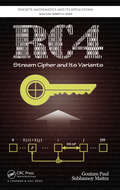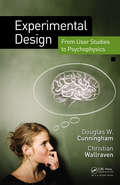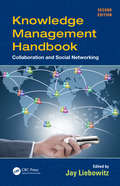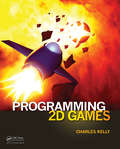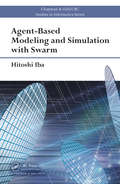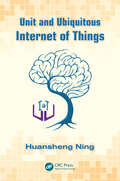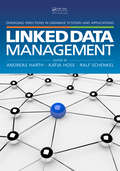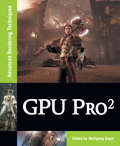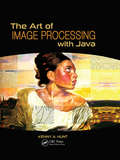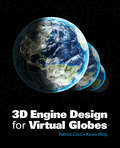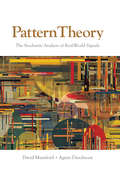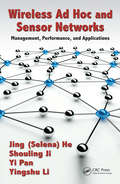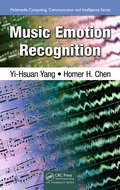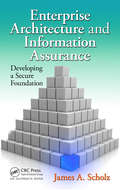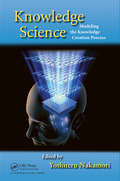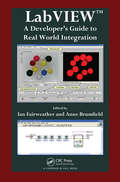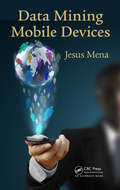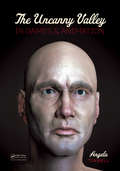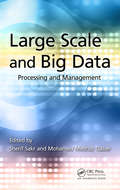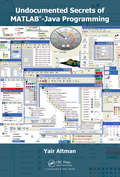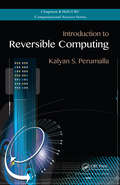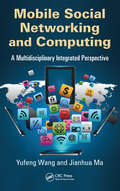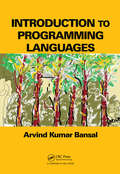- Table View
- List View
RC4 Stream Cipher and Its Variants
by Goutam Paul Subhamoy MaitraRC4 Stream Cipher and Its Variants is the first book to fully cover the popular software stream cipher RC4. With extensive expertise in stream cipher cryptanalysis and RC4 research, the authors focus on the analysis and design issues of RC4. They also explore variants of RC4 and the eSTREAM finalist HC-128.After an introduction to the vast field of
Experimental Design: From User Studies to Psychophysics
by Douglas W. Cunningham Christian WallravenAs computers proliferate and as the field of computer graphics matures, it has become increasingly important for computer scientists to understand how users perceive and interpret computer graphics. Experimental Design: From User Studies to Psychophysics is an accessible introduction to psychological experiments and experimental design, covering th
Knowledge Management Handbook: Collaboration and Social Networking, Second Edition
by Jay LiebowitzRecent research shows that collaboration and social networking foster knowledge sharing and innovation by sparking new connections, ideas, and practices. Yet these informal networks are often misunderstood and poorly managed. Building on the groundbreaking, bestselling first edition, Knowledge Management Handbook: Collaboration and Social Networkin
Programming 2D Games
by Charles KellyA First Course in Game ProgrammingMost of today's commercial games are written in C++ and are created using a game engine. Addressing both of these key elements, Programming 2D Games provides a complete, up-to-date introduction to game programming. All of the code in the book was carefully crafted using C++. As game programming techniques are intro
Agent-Based Modeling and Simulation with Swarm (Chapman & Hall/CRC Studies in Informatics Series)
by Hitoshi IbaSwarm-based multi-agent simulation leads to better modeling of tasks in biology, engineering, economics, art, and many other areas. It also facilitates an understanding of complicated phenomena that cannot be solved analytically. Agent-Based Modeling and Simulation with Swarm provides the methodology for a multi-agent-based modeling approach that i
Unit and Ubiquitous Internet of Things
by Huansheng NingAlthough the Internet of Things (IoT) will play a key role in the development of next generation information, network, and communication technologies, many are still unclear about what makes IoT different from similar concepts.Answering fundamental questions about IoT architectures and models, Unit and Ubiquitous Internet of Things introduces essen
Linked Data Management (Emerging Directions in Database Systems and Applications)
by Katja Hose Andreas Harth Ralf SchenkelLinked Data Management presents techniques for querying and managing Linked Data that is available on today's Web. The book shows how the abundance of Linked Data can serve as fertile ground for research and commercial applications.The text focuses on aspects of managing large-scale collections of Linked Data. It offers a detailed introduction to L
GPU Pro 2
by Wolfgang EngelThis book focuses on advanced rendering techniques that run on the DirectX and/or OpenGL run-time with any shader language available. It includes articles on the latest and greatest techniques in real-time rendering, including MLAA, adaptive volumetric shadow maps, light propagation volumes, wrinkle animations, and much more. The book emphasizes te
The Art of Image Processing with Java
by Kenny A. HuntThis introductory image processing text is ideal for college students studying computer science or software engineering. With an emphasis on software design, the text builds on an accessible mathematical foundation and on extensive sample Java code to teach students the fundamentals of image processing. The text is accompanied by rich illustrations that demonstrate the results of performing processing on famous art pieces. This approach gives readers real-world examples of ways they may use image processing. Each chapter includes problems for students, and an online supplement offers instructor resources.
3D Engine Design for Virtual Globes
by Patrick Cozzi Kevin RingSupported with code examples and the authors' real-world experience, this book offers the first guide to engine design and rendering algorithms for virtual globe applications like Google Earth and NASA World Wind. The content is also useful for general graphics and games, especially planet and massive-world engines. With pragmatic advice throughout
Pattern Theory: The Stochastic Analysis of Real-World Signals
by David Mumford Agnès DesolneuxPattern theory is a distinctive approach to the analysis of all forms of real-world signals. At its core is the design of a large variety of probabilistic models whose samples reproduce the look and feel of the real signals, their patterns, and their variability. Bayesian statistical inference then allows you to apply these models in the analysis o
Discrete Dynamical Systems and Chaotic Machines: Theory and Applications (Chapman & Hall/CRC Numerical Analysis and Scientific Computing Series #20)
by Christophe Guyeux Jacques BahiUntil the authors' recent research, the practical implementation of the mathematical theory of chaos on finite machines raised several issues. This self-contained book shows how to make finite machines, such as computers, neural networks, and wireless sensor networks, work chaotically as defined in a rigorous mathematical framework. Taking into account that these machines must interact in the real world, the authors share their research results on the behaviors of discrete dynamical systems and their use in computer science.
Wireless Ad Hoc and Sensor Networks: Management, Performance, and Applications
by Yi Pan Yingshu Li Jing (Selina) He Mr. Shouling JiAlthough wireless sensor networks (WSNs) have been employed across a range of applications, there are few books available that cover the required algorithms, performance analysis, and applications of network management techniques in WSNs. Filling this need, this book presents new network management techniques that can address many of the shortcomings of traditional techniques. It summarizes traditional and classical network management techniques as well as state-of-the-art methods.
Statistical Learning and Data Science
by Fionn Murtagh Mireille Gettler Summa Léon Bottou Bernard Goldfarb Catherine Pardoux Myriam TouatiData analysis is changing fast. Driven by a vast range of application domains and affordable tools, machine learning has become mainstream. Unsupervised data analysis, including cluster analysis, factor analysis, and low dimensionality mapping methods continually being updated, have reached new heights of achievement in the incredibly rich data wor
Music Emotion Recognition (Multimedia Computing, Communication and Intelligence)
by Yi-Hsuan Yang Homer H. ChenProviding a comprehensive review of existing work in music emotion developed in psychology and engineering, this book explains how to account for the subjective nature of emotion perception in the development of automatic music emotion recognition (MER) systems. Among the first publications dedicated to automatic MER, it begins with a complete introduction to the essential aspects of MER-including background, key techniques, and applications. This ground-breaking reference examines emotion from a dimensional perspective. It defines emotions in music as points in a 2D plane in terms of two of the most fundamental emotion dimensions according to psychologists-valence and arousal.
Enterprise Architecture and Information Assurance: Developing a Secure Foundation
by James A. ScholzThis book provides guidance on designing complex, highly available enterprise architectures that integrate the most critical aspects of an organization's business processes. Considering the lack of tolerance of enterprise for operational interruptions or the risks that accompany theft and loss of data, this reference describes how to ensure your organization is prepared for the unexpected. The text also aids in containing liability with guidance on network and application vulnerability assessments, intrusion detection and penetration testing, incident response planning, risk mitigation audits/reviews, and business continuity and disaster recovery planning.
Knowledge Science: Modeling the Knowledge Creation Process
by Yoshiteru NakamoriExplaining how to improve our knowledge-based society, this book addresses problems in collecting, synthesizing, coordinating, and creating knowledge. It provides knowledge engineering tools and a framework for integrating knowledge creation, discovery, and management. The text covers knowledge technology, knowledge management, knowledge discovery and data mining, knowledge synthesis, knowledge justification, and knowledge construction. Experienced researchers in decision science, artificial intelligence, systems engineering, behavioral science, and management science present new methods for creating technological innovation from existing knowledge, such as IT techniques, organizational theory, and mathematical systems theory.
LabVIEW: A Developer's Guide to Real World Integration
by Ian Fairweather Anne BrumfieldLabVIEW™ has become one of the preeminent platforms for the development of data acquisition and data analysis programs. LabVIEW™: A Developer’s Guide to Real World Integration explains how to integrate LabVIEW into real-life applications.Written by experienced LabVIEW developers and engineers, the book describes how LabVIEW has been pivotal in solving real-world challenges. Each chapter is self-contained and demonstrates the power and simplicity of LabVIEW in various applications, from image processing to solar tracking systems. Many of the chapters explore how exciting new technologies can be implemented in LabVIEW to enable novel solutions to new or existing problems. The text also presents novel tricks and tips for integrating LabVIEW with third-party hardware and software.Ideal for LabVIEW users who develop stand-alone applications, this down-to-earth guide shows how LabVIEW provides solutions to a variety of application problems. It includes projects and virtual instrumentation for most of the programs and utilities described. Many of the authors’ own software contributions are available on the downloadable resources.
Data Mining Mobile Devices
by Jesus MenaWith today's consumers spending more time on their mobiles than on their PCs, new methods of empirical stochastic modeling have emerged that can provide marketers with detailed information about the products, content, and services their customers desire.Data Mining Mobile Devices defines the collection of machine-sensed environmental data pertainin
The Uncanny Valley in Games and Animation
by Angela TinwellAdvances in technology have enabled animators and video game designers to design increasingly realistic, human-like characters in animation and games. Although it was intended that this increased realism would allow viewers to appreciate the emotional state of characters, research has shown that audiences often have a negative reaction as the human
Large Scale and Big Data: Processing and Management
by Mohamed Medhat Gaber Sherif SakrLarge Scale and Big Data: Processing and Management provides readers with a central source of reference on the data management techniques currently available for large-scale data processing. Presenting chapters written by leading researchers, academics, and practitioners, it addresses the fundamental challenges associated with Big Data processing t
Undocumented Secrets of MATLAB-Java Programming
by Yair M. AltmanFor a variety of reasons, the MATLAB-Java interface was never fully documented. This is really quite unfortunate: Java is one of the most widely used programming languages, having many times the number of programmers and programming resources as MATLAB. Also unfortunate is the popular claim that while MATLAB is a fine programming platform for proto
Introduction to Reversible Computing (Chapman & Hall/CRC Computational Science #19)
by Kalyan S. PerumallaCollecting scattered knowledge into one coherent account, this book provides a compendium of both classical and recently developed results on reversible computing. It offers an expanded view of the field that includes the traditional energy-motivated hardware viewpoint as well as the emerging application-motivated software approach. It explores up-and-coming theories, techniques, and tools for the application of reversible computing. The topics covered span several areas of computer science, including high-performance computing, parallel/distributed systems, computational theory, compilers, power-aware computing, and supercomputing.
Mobile Social Networking and Computing: A Multidisciplinary Integrated Perspective
by Jianhua Ma Yufeng WangRecent advancements in mobile device technologies are revolutionizing how we socialize, interact, and connect. By connecting the virtual community with the local environment, mobile social networks (MSNs) create the opportunity for a multitude of new personalized services for mobile users. Along with that comes the need for new paradigms, mechanism
Introduction to Programming Languages
by Arvind Kumar BansalIn programming courses, using the different syntax of multiple languages, such as C++, Java, PHP, and Python, for the same abstraction often confuses students new to computer science. Introduction to Programming Languages separates programming language concepts from the restraints of multiple language syntax by discussing the concepts at an abstrac
